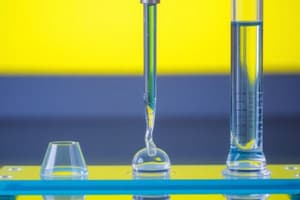Podcast
Questions and Answers
What is rheology?
What is rheology?
- The investigation of plant physiology
- The branch of chemistry that focuses on bonding between atoms
- The study of electricity and magnetism
- The science that deals with the flow and deformation of matter (correct)
What are the rheometers used for in rheometry?
What are the rheometers used for in rheometry?
- Analyze the color changes in different materials
- Study the flow and deformation of materials (correct)
- Measure the electrical conductivity of substances
- Determine the boiling point of liquids
What does viscosity refer to in the context of rheology?
What does viscosity refer to in the context of rheology?
- The color of a fluid
- The temperature at which a fluid boils
- The ability of a fluid to conduct electricity
- A fluid's resistance to flow (correct)
What does viscometry measure?
What does viscometry measure?
What properties can rheometers measure in rheometry?
What properties can rheometers measure in rheometry?
Why is understanding rheology crucial in various industries?
Why is understanding rheology crucial in various industries?
What is the primary purpose of a rheometer?
What is the primary purpose of a rheometer?
Which technique involves subjecting a material to oscillatory forces or strains while simultaneously measuring its response?
Which technique involves subjecting a material to oscillatory forces or strains while simultaneously measuring its response?
What type of industry benefits from understanding the rheological properties of food products such as viscosity, elasticity, and flow behavior?
What type of industry benefits from understanding the rheological properties of food products such as viscosity, elasticity, and flow behavior?
What does rheology study in the cosmetics and personal care industry?
What does rheology study in the cosmetics and personal care industry?
Which field benefits from understanding the rheological behavior of drug formulations, hydrogels, and biological fluids?
Which field benefits from understanding the rheological behavior of drug formulations, hydrogels, and biological fluids?
What does Dynamic Mechanical Analysis (DMA) provide valuable insights into?
What does Dynamic Mechanical Analysis (DMA) provide valuable insights into?
Which technique is used in rheology to study materials' behavior under different flow conditions?
Which technique is used in rheology to study materials' behavior under different flow conditions?
What is essential for developing and optimizing food formulations in the food and beverage industry?
What is essential for developing and optimizing food formulations in the food and beverage industry?
Flashcards are hidden until you start studying
Study Notes
Rheology: Understanding the Flow of Matter
Rheology is the science that deals with the flow and deformation of matter. It is a branch of physics and materials science that explores how materials respond to applied forces. Understanding rheology is crucial in various industries, including food, cosmetics, pharmaceuticals, and construction. In this article, we will delve into rheology, exploring the measurement techniques used to study it and its wide-ranging applications.
Rheological Measurement Techniques
1. Viscometry
Viscometry is a widely used technique to measure the viscosity of fluids. Viscosity refers to a fluid's resistance to flow, and it is a key property in rheology. There are several methods of viscometry, including capillary viscometry, rotational viscometry, and falling ball viscometry. These methods involve measuring the time it takes for a fluid to flow through a specific geometry under the influence of gravity or an applied force. By analyzing these flow characteristics, researchers can determine the viscosity of the fluid and understand its rheological behavior.
2. Rheometry
Rheometry involves the use of rheometers to study the flow and deformation of materials under applied forces. These instruments can measure various rheological properties, such as viscosity, elasticity, and viscoelastic behavior. Rheometers apply controlled stress or strain to a sample and measure its response, allowing researchers to characterize the material's flow behavior under different conditions. Oscillatory rheometry, rotational rheometry, and extensional rheometry are some of the techniques used in rheology to analyze materials' behavior under different flow conditions.
3. Dynamic Mechanical Analysis (DMA)
Dynamic Mechanical Analysis is a powerful technique used to study the mechanical properties of materials as a function of temperature, time, frequency, and stress/strain. It provides valuable insights into the viscoelastic behavior of materials, including polymers, composites, and biomaterials. DMA involves subjecting a material to oscillatory forces or strains while simultaneously measuring its response. This allows researchers to understand how the material behaves under dynamic conditions, providing critical information for material design and performance evaluation.
Applications of Rheology
1. Food and Beverage Industry
Rheology plays a vital role in the food and beverage industry, where the flow and deformation behavior of products significantly impact their quality and consumer experience. Understanding the rheological properties of food products, such as viscosity, elasticity, and flow behavior, is essential for developing and optimizing food formulations. For example, in the production of sauces, dressings, and dairy products, rheological measurements help ensure the desired texture, stability, and mouthfeel of the final products.
2. Cosmetics and Personal Care Products
In the cosmetics and personal care industry, rheology is instrumental in product development and formulation. The texture, spreadability, and stability of creams, lotions, and gels are influenced by their rheological properties. By studying the flow behavior of these products, manufacturers can optimize their formulations to achieve the desired consistency, appearance, and performance. Rheological measurements also aid in quality control and product stability assessment in cosmetic and personal care applications.
3. Pharmaceutical and Biomedical Applications
Rheology plays a critical role in pharmaceutical and biomedical research, particularly in the development of drug delivery systems, biomaterials, and medical devices. Understanding the rheological behavior of drug formulations, hydrogels, and biological fluids is essential for ensuring optimal performance and efficacy. Rheological studies help researchers assess the flow characteristics, injectability, and release kinetics of pharmaceutical formulations, contributing to the development of improved drug delivery systems and medical treatments.
4. Construction and Civil Engineering
In the construction and civil engineering sectors, rheology is essential for understanding the behavior of concrete, asphalt, and other construction materials. The flow, viscosity, and setting properties of these materials significantly influence the construction processes and the performance of the final structures. Rheological measurements aid in optimizing concrete mixtures, evaluating the workability of fresh concrete, and predicting the long-term behavior of construction materials, contributing to the safety and durability of infrastructure projects.
In conclusion, rheology is a multidisciplinary field with diverse applications across various industries. By employing advanced measurement techniques such as viscometry, rheometry, and dynamic mechanical analysis, researchers and engineers can gain valuable insights into the flow and deformation behavior of materials. From enhancing the quality of consumer products to improving medical treatments and construction materials, rheology continues to play a pivotal role in shaping and advancing numerous fields.
Studying That Suits You
Use AI to generate personalized quizzes and flashcards to suit your learning preferences.




